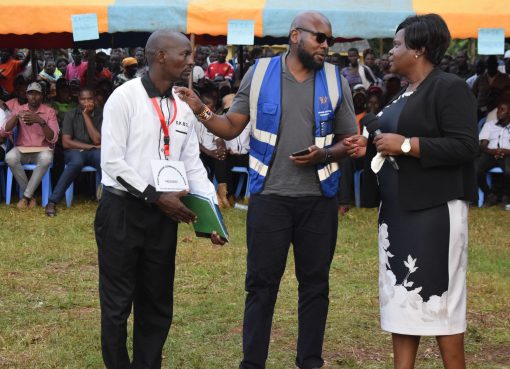More than 3,000 small-scale farmers in Moiben Constituency of Uasin Gishu County are expected to benefit from the Sh350 million Lower Sabor Irrigation Development Project when complete.
Water, Sanitation, and Irrigation Chief Administrative Secretary (CAS) Andrew Tuimur said the project that commenced in 2012 is currently serving over 700 farmers.
Speaking during an inspection tour of the project, the CAS was confident that the number of farmers benefiting from the project would increase once the last mile of the project, which will consist of connecting infield pipes and the provision of irrigation equipment to the farmers at a cost Sh40 million is completed.
Dr Tuimur confirmed that the project was at 99 percent completion with the remaining 1 percent expected to be complete before the end of March 2022.
The project will immensely boost small-scale horticulture farming in the area, said the CAS adding when completed, the project will see over 1500 acres of agricultural land placed under irrigation in a move that will not only boost food production with increased food security but also enable the small scale farmers to increase their income.
“It is our desire to improve irrigation coverage in the country from the current 600,000 acres to about 1.3 million before 2030,” Dr Tuimur said.
He said food security is an integral part of the government’s big four agenda adding the government through projects like these is committed to making Kenya a food secure nation.
“I urge farmers in this area to take advantage of the project and diversify into horticultural farming in order to supplement their income,” he said.
The irrigation project which is situated along the Uasin Gishu and Elgeyo Marakwet counties border had experienced setbacks due to community conflicts but the CAS assured the public that adequate consultation has been done to solve the problem stating there is no possibility of the same recurring in the future.
Tuimur further said that the ministry will construct two additional water pans in the area to assist in water harvesting.
The CAS further said the government was committed to improving water and sanitation coverage nationally.
“Our water coverage nationally is still low at 60 percent, but we intend to improve coverage to 100 percent by the year 2030 in order for the country to achieve universal water coverage,” he said.
He also said there are various projects undertaken by the government to improve sanitation from a low of 20 percent currently to at least 80 percent by 2030.
Uasin Gishu County, Livestock and Fisheries Chief Officer Barnabas Too, who accompanied the CAS during the tour said the county government was ready to partner with the farmers through the provision of extension services to ensure farmers take full advantage of the available water resource.
By Brian Kipkenei





